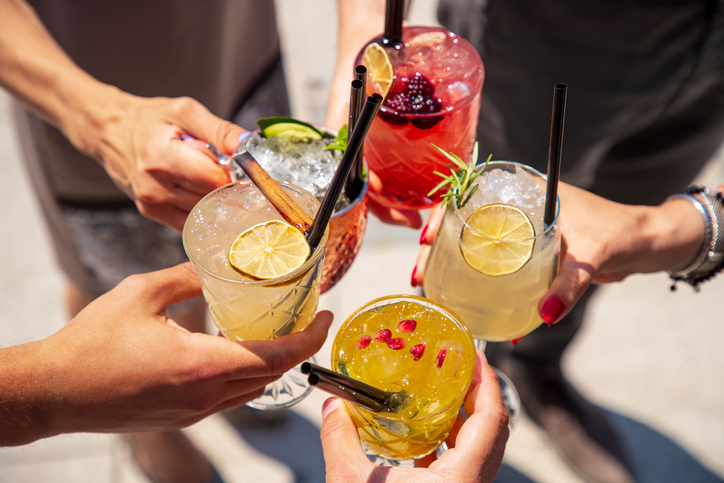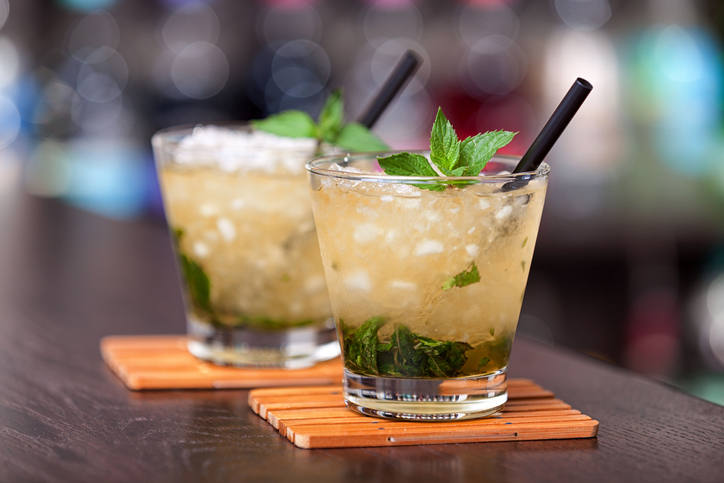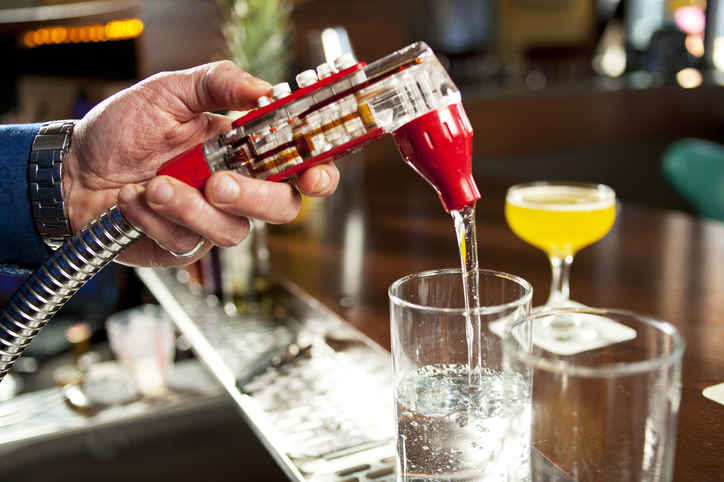Surviving Cocktail Culture With Diabetes
By Alexandra Frost

For those with diabetes, it can be hard to deal with pressure from friends to drink and to keep track of their blood sugar levels, but there are ways to indulge in a cocktail without harming your health.
Margaritas the size of fish bowls at Taco Tuesday. Punch at your friend’s kid’s party. Beers at a tailgate. Cocktail culture is everywhere, the call to drink alcohol infused into every aspect of our social lives. But for people with diabetes, what’s meant to be a fun, kick-back vibe can be fraught with challenges, from that same peer pressure you felt as a teen to drink to extra monitoring of blood glucose levels or hypoglycemia (low blood sugar) concerns if you do partake.
But after a long day, a few drinks with friends can be tempting in spite of the risks, both for people with diabetes and without. If you do, here’s how to healthily indulge in cocktail culture without harming your health.
Stick to a moderate amount of alcohol consumption
According to the American Diabetes Association, having an alcoholic drink or two a day is actually associated with greater insulin sensitivity. Still, there are caveats.
“Drinking a glass of wine at dinner is acceptable, but drinking a mojito on an empty stomach at happy hour isn't a good idea” if you have diabetes, said Dr. Neel Shah, endocrinologist and associate professor at McGovern Medical School at UTHealth Houston.
Alcohol interferes with the body's metabolic process
The reason for this? Alcohol intake affects the liver and metabolism, increasing the risk of low blood sugar. “The reason is that the liver prioritizes metabolizing the alcohol over maintaining the stability of the glucose in the bloodstream,” he said, “as a result, patients will get hypoglycemic.”
Shah advised that mild to moderate alcohol use (such as one drink or two) is acceptable, but heavy alcohol consumption can lead to cardiovascular problems for people with diabetes (who are already at higher risk for cardiovascular disease). He added that people with type 1 diabetes are more susceptible in general to low blood sugar and DKA than those with type 2 diabetes, and that low blood sugar is especially concerning when people with diabetes are taking medications for diabetes, like insulin or sulfonylureas such as glimepiride or glipizide, which can also increase the risk for low blood sugar.
Learn to identify carb-filled cocktails
 When it comes to drinking with diabetes, straight liquor has a significantly different impact than a sugar-filled mixed drink. In particular, restaurant cocktails and well drinks are often laden with hidden calories, carbs, and sugar from added sweeteners and mixers.
When it comes to drinking with diabetes, straight liquor has a significantly different impact than a sugar-filled mixed drink. In particular, restaurant cocktails and well drinks are often laden with hidden calories, carbs, and sugar from added sweeteners and mixers.
Which alcoholic drinks have the most carbs?
Some of the biggest culprits, according to an analysis of drinks by Eat This, Not That! using USDA’s FoodData Central, include:
-
Mint Juleps, with 400 calories and 13 g of sugar
-
Long Island Iced Tea, with 241 calories and 19 g of sugar
-
Mojitos, with 203 calories and 25.5 g of sugar
-
Margaritas, with 274 calories and 36.1 g of sugar
-
Daiquiris with 286 calories and 39.7 g of sugar
-
Pina Coladas with 340 calories and 39.6 g of sugar
Talk about a buzz kill. Fortunately, if you have diabetes, you can still enjoy tasty and fun cocktails with some modifications for lower-carb cocktails that won't wreak havoc on blood glucose levels.
What kind of cocktail can a person with diabetes have?
Mark Joseph, 32, a St. Louis, Missouri-based parenting coach who lives with type 2 diabetes, says drinking and navigating cocktail hour with diabetes is a challenge for him.
“I've noticed that some types of alcohol affect my blood sugar levels more than others. Dessert wines can have a higher glycemic index which can cause my levels to spike. I avoid these drinks and opt for lower-sugar cocktails,” he said, citing tequila or vodka with soda water as examples.
Joseph recalled drinking too much one night and it led to some “drastic” blood sugar fluctuations. “Thankfully, I was with friends who noticed and helped me regain control,” he said. “Now, I ensure that I always check my levels frequently.”
Shah echoes Joseph’s advice for people with diabetes to watch for drinks with fillers or higher sugar. “What makes drinking challenging is that some drinks are high in carbs such as dessert wines, whereas some drinks are carb-free or low carb like most wines and spirits,” Shah said.
Skip sugary fillers when drinking alcohol
If you have diabetes, some tricks for lowering sugar content when drinking include:
-
Sweetening an alcoholic drink with lemon or lime in place of sugary syrups and fruit juices
-
Drinking straight liquor, such as vodka, rather than a mixed cocktail
-
Using zero-calorie sparkling water, club soda, or sugar-free diet tonic as mixers with liquor
-
Checking beers for their carb content before consuming
Dietician and diabetes educator Crystal Scott at Top Nutrition Coaching recommends working with the restaurant or bartender to learn about drinks offered that are the lowest in sugar or those that can be modified. Look for menu options that say “skinny” or have other indications that the restaurant is intentionally leaving out additional fillers, or ask for these options.
Keep alcoholic drinks one-for-one with water
 One of Joseph’s go-to tricks for preventing another blood sugar issue while drinking is to mitigate alcohol’s impact with a lot of water.
One of Joseph’s go-to tricks for preventing another blood sugar issue while drinking is to mitigate alcohol’s impact with a lot of water.
“To stay safe, I always plan to keep myself hydrated throughout the night and snack on something before I drink,” he said.
Alcohol affects hydration levels
The reason is that alcohol is dehydrating, which gives you that nasty next-day hangover feeling as well. Try to drink plenty – at least one full glass – of water per cocktail you drink.
“There is no universal way to tackle alcohol consumption in diabetes other than keeping consumption in moderation, monitoring glucose levels, and paying attention to symptoms and limits,” Shah added.
Enjoy a drink without fear, but listen to your body
Scott doesn’t want clients with diabetes stressing too much about a drink; for most people, going out and having a drink occasionally isn’t going to be harmful. “One cocktail is okay! It’s okay,” she said. “I don’t want them to be scared to go out on a Friday night and have a drink with friends.”
If you have diabetes, make sure to eat some food beforehand
To drink safely, just make sure you grab dinner beforehand so that you avoid drinking on an empty stomach. “The biggest thing is making sure you are eating first,” she said, explaining that skipping food can lead to poorer food choices, which might require more medication, furthering the cycle.
Scott also advises keeping an eye on blood sugars – for some, setting alerts before happy hour can be helpful – and remembering not to go overboard with too much alcohol, especially on an empty stomach. “When you’re going out and being social, it can be hard to stop.”
Last but not least: Don’t hide your drinking inclinations from your providers, most of whom likely care more about keeping you healthy than judging your drinking habits. Shah's final piece of advice: “Always talk to your friendly neighborhood endocrinologist if you have any questions.”








